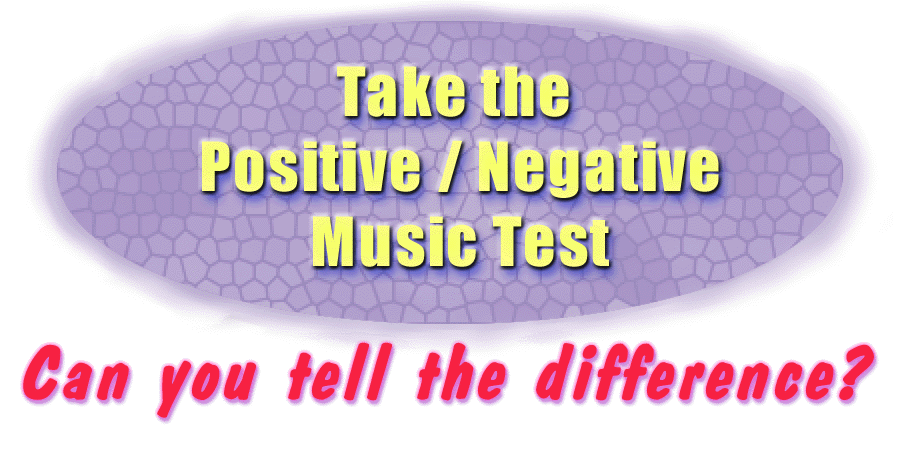About Positive Music
by Don Robertson
Positive Music
Positive music can be found in all
cultures and all times. The world has a treasure trove of great music. With the advent of
advanced sound-reproduction technologies such as the CD and the internet, this treasure
trove is only now being discovered. For example, during the last decade of the 20th
century, many people in Europe and America discovered for the first time a music that they
had never heard of before: Gregorian chant. In fact, a recording of Gregorian chant
reached pop music status in England, much the same as Pachabel’s Canon in D
had done during the 1970s. What did people find so enjoyable about such music? Gregorian
chant, if you will, was "church music"…. medieval church music at that! What
people liked about Gregorian chant was the calm, serene state of mind, and the warm
feeling that the music induced in them.
I personally know about the power of
chant. During the 1970s, I used recordings of Gregorian chant in my work
counseling people
with problems, and I found that the music could have miraculous effects. I once played a
recording of my favorite Gregorian chants for a lady musician friend, and she immediately
broke into tears of love and joy before me.
If you listen to the radio carefully
and use your powers of discernment to gain a sense of the degree of negativity in the music
that you hear on the radio and TV today, you will find a great deal of the music that is
lacking in positive influence. Pop music has gone down hill so much since its heyday in
1954 that the difference is shocking. In 1954, the songs of the top forty were positive,
reinforcing, romantic. Singers sang with their heart, and people felt their
songs. There are some wonderful, great singers, today—thank God for that—but
there is also a lot of really inferior, mediocre singers and music that expresses little
in the lyrics, and nothing emotionally--except perhaps for anger and hatred. And so many
people have gotten used to mediocrity and ugliness in music that it isn’t even
noticed anymore. And rap music? It is the final blow to song: It is "the Grinch who
stole Melody."
Rock music has become a vehicle for
negative music. However, when I talk about rock music being negative, I want to make it
clear I am not talking about all rock music. A person who develops their sense of
discernment will be able to tell the difference. That is they key. In 1969, I discovered
the rock band called the Moody Blues. I fell in love with the Moody Blues and
love their music to this day. Their first seven albums were the crème of their work and
far surpass all they have done since. The Moody Blues are the positive rock band’s
positive rock band. In my opinion, no other group can match the Moody Blues in the ability
to infuse rock music with positive feelings and content.
The first time that I saw the Moody Blues
in concert was at the Denver Coliseum in 1970. At that time, their records were the only
records that I was listening to, and I was extremely anxious to see them. The Moody Blues
did not play first and I remember well the band that opened the show for them. It was a
negative band. From their act and the sound of their music, I guessed that they were
probably all loaded on heroin and speed. They were grinding out guitar discords while the
lead singer angrily shouted out his songs, and the drummer beat on his snare and cymbals.
The concert had been sold out and there was a near-riot occurring in front of the coliseum
because so many people had to be turned back. Not wanting to listen to the opening band, I
decided to walk around and survey the situation. Needless to say, the air was filled with
tension and apprehension. Tempers were short. People were uptight.
The tension continued to mount and
finally, the opening band was finished. They left the stage, and on came the Moody Blues.
The Moody Blues stepped up to their microphones, and as they launched into their opening
number, Gypsy, the auditorium was suddenly filled with blue light. It was
awesome. The Moody Blues held everyone spellbound for two hours. The music was lofty and
spiritually uplifting. When the concert was over, I noticed that people were relaxed,
smiling, beaming. I spoke with one fellow who had a transformative spiritual experience
during the concert. His whole being had been transformed, filled with light, and he had
witnessed the presence of angels around him.
I had an experience like that myself in
the San Francisco Opera House, of all places. The second act of Wagner’s Tristan and
Isolde took me to heights well beyond normal reality: a realm of light and beauty, and I
could see and sense the presence of angels all around me. These kinds of experiences are
life-transforming and are never forgotten. Individuals who haven’t realized the
existence of God and the spiritual world will scoff at words such as these, but
nevertheless, this is the truth. And this is the ultimate testimony of music: a great
agent of transformation for today’s society-in-need.

Click Here to
Find Out More
* * *
|

